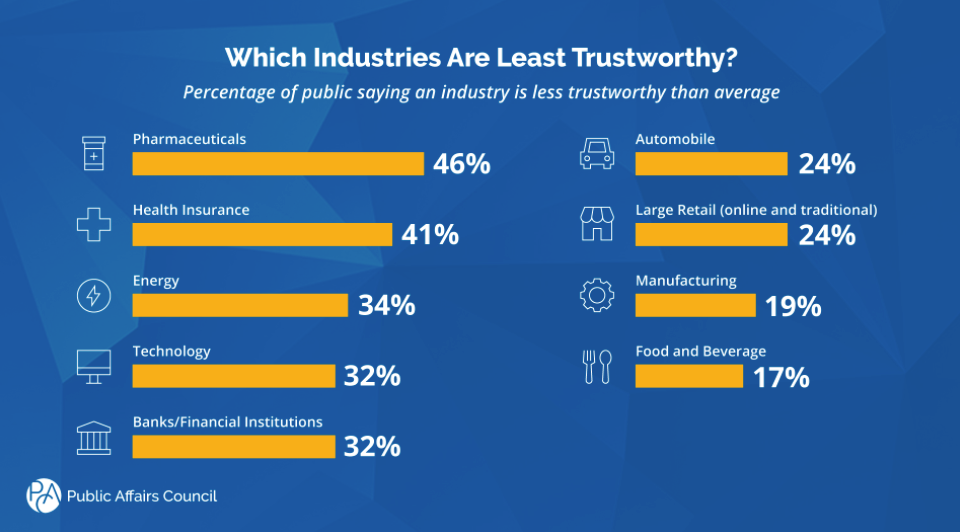Facebook 230 Reform, Google Goes After Lowe, Digital Trust Crisis

Haugen: The Algorithm Is the Evil
It's only a couple of days since former Facebook PM Frances Haugen appeared on 60 Minutes. (You're probably already burned out on Facebook news.) But in her testimony before Congress yesterday, Haugen argued that breaking up Facebook wouldn't fix the problems she whistle-blew about. She instead made two primary recommendations: create an outside regulatory agency to police the algorithm and reform Section 230. Her latter suggestion is to make Facebook/platforms liable for harmful or illegal content, where the algorithm is the source of liability rather than individual pieces of content. How that might work in practice is uncertain, although former Facebook data scientist Roddy Lindsay agrees. He believes Section 230 reform would force the end of the algorithm-based personalized news feed, which might solve the destructive content problem.

Our take:
- Despite Facebook's newly defiant PR pushback, there's a consensus in DC that "something needs to be done." What precisely is TBD; Haugen's suggestions are a potential start.
- Antitrust probably isn't the way, as Facebook seeks a second dismissal of the FTC's amended antitrust complaint. Indeed, the FTC's antitrust suit is likely to fail because: TikTok, YouTube.
- Separately, the Facebook outage this week (in contrast to outrage) stopped marketing and commerce for millions – especially SMBs – pointing to a need for more marketing diversification.
Google Targets Yelp's Lowe with Document Motion
The DOJ filed its antitrust case against Google a year ago. The parties are now in pre-trial "discovery," where depositions are taken and documents exchanged. Google has sought a huge trove of documents from Yelp and in particular from Luther Lowe, Yelp's SVP of public policy. Yelp has declined to produce them and Google has now filed a motion to compel. The company sees Lowe as a one of the architects of the DOJ's antitrust case. Exhibit C in the motion (.pdf) contains extremely broad requests. For example: "All documents related to the Company’s strategies or plans for attracting or retaining users and user traffic and queries to its properties, including all supporting data" as well as for very detailed information such as "the top 250 advertisers by revenue with U.S. advertising spend on the Company’s properties in any year from 2010 onwards."

Our take:
- On its face, Google's document request seems overly broad, as lawyers like to say, reflecting the bitterness of the companies' feud.
- Google's lawyers want volumes of sensitive, proprietary information, which would expose Yelp’s business strategies to its chief rival.
- Parts of the request are legitimate, however. And court is likely to grant Google's motion in part and deny it in part.
Digital Trust Erosion, an Emerging Crisis
Facebook epitomizes the current moment (yes, another Facebook item). It's a platform nearly everyone uses but few people trust. The broader erosion of trust in digital platforms is becoming a crisis, though one not widely discussed – or perceived as much of a threat by the platforms. Three items make the point. A WaPo article discusses how the e-commerce market is now being flooded with low-quality lookalike products, making online shopping "impossible." A new Public Affairs Council survey shows how tech has fallen from a position of top consumer trust a decade ago to sixth place among industries today. And a 2020 GroupM survey of 14,000 consumers shows rising levels of privacy concern and distrust for tech companies. Many other data studies and surveys support the notion that there's a digital trust crisis developing.

Our take:
- GroupM's report makes the case that the more it's trusted, the higher the value of the brand – and the easier it is to acquire customers.
- Fake reviews is an example close to home. Reviews have built trust in companies, now review fraud is sowing distrust and suspicion.
- The big tech companies don't appear to worry much about trust declining because their users are effectively locked in (with some exceptions).
Short Takes
- 5-Pack: Google testing local packs with variable results.
- US local advertising to grow 6.4% in 2022, reach $138 billion.
- TikTok formally crosses 1 billion users milestone.
- TikTok Chinese parent seeking to build an Amazon competitor.
- Pandion aims to speed shipping/logistics for smaller retailers.
- Reveal Mobile buys Mira, OOH analytics provider.
- Fintech company Slice offering a 3-day week at 80% salary.
- Google using free-speech defense against Ohio SERP regulation bid.
- HomeDepot using Walmart's GoLocal for local deliveries.
- Mailchimp launches email content (performance) optimizer for SMBs.
- WhatsApp outage more damaging globally than Facebook going down.
- POV: Siri's decade of missteps and missed opportunity.
- 20% of CMOs don't measure customer lifetime value.
- Hard-to-find products will be a perk of BestBuy's loyalty program.
- Surveillance tourism in Venice Italy (NY Times).
Listen to our latest podcast.

How can we make this better? Email us with suggestions and recommendations.

